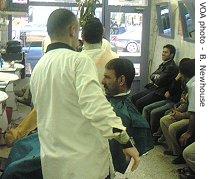2007年VOA标准英语-Iraqis Flee to Kurdish North in Search of Safet
时间:2019-01-10 作者:英语课 分类:2007年VOA标准英语(六月)
Irbil
06 June 2007
The U.N. refugee agency reported this week that some 4 million Iraqis have been displaced by the war and more than half of those have left the country. The rest are looking for a safe haven 1 in Iraq, and some of those have found it in Iraq's Kurdish north. VOA's Barry Newhouse visited an office keeping track of the displaced Iraqis and has this report.
A worker in the residency office for the Kurdistan Regional Government stamps documents for newly arrived Iraqis in a crowded waiting room. Most of the people here are Sunni Arabs who have come from Baghdad, Mosul and Ramadi. Many of them refuse to talk about their plight 2.
One man says the situation in Baghdad has become so dire 3, that despite the ongoing 4 security operation, this week he finally decided 5 to leave.

Displaced resident 'Bashar' at work in an Irbil barbershop
He says he faced many problems in Baghdad from terrorist gangs and from Iraqi security forces that have sectarian agendas. He says the dangers and the economic situation became so bad that he had to flee.
This office issues permits for one of Iraq's three Kurdish-controlled provinces. Since 2005, it has granted temporary residency permits to nearly 30,000 people - a small fraction of those in need.
U.N. refugee agency officials say fleeing Iraqis have overwhelmed local governments in some areas of the country. But U.N. officials also have criticized regions that turn away people who need assistance.
Kurdish security forces restrict entrance to fleeing Iraqis at tightly controlled checkpoints, denying entry to people considered security risks. In general, Kurdish officials say they let in professional workers, such as doctors and engineers, or those who can have a local resident vouch 6 for them.
Recently arrived Arabs in Kurdistan say they understand the need for controlling access.
This man says that he is not disturbed by the practice, because there are some
Iraqis who work with terrorist gangs, and the Kurdish forces must protect the region.
Those Iraqis who qualify for entry say staying in Iraqi Kurdistan is much better option than fleeing to Syria or Jordan. This businessman from Baghdad says in Syria, Iraqi refugees live in a legal limbo 7, in constant threat of deportation 8.
He says many families sell their homes and their possessions and go to Syria. But there, even if they have the permit from the U.N. refugee office, they will spend all of their savings 9, because there are no jobs. He says life there is expensive. In Kurdistan, he says, you can work.
But the influx 10 of wealthy Iraqis has pushed up the cost of living for Irbil residents as well. This Iraqi man, who has arrived recently, says he understands the locals are getting upset.
He says we know that rents are getting high, and it is bad for the poorest people here. But, he says, "We don't have a choice."
U.N. officials say the plight of Iraqis fleeing violence is getting worse, yet calls for international help have brought few results.
In Irbil's residency office, several Iraqis said they were not looking for handouts 11, but merely a chance to start over after losing everything.
- It's a real haven at the end of a busy working day.忙碌了一整天后,这真是一个安乐窝。
- The school library is a little haven of peace and quiet.学校的图书馆是一个和平且安静的小避风港。
- The leader was much concerned over the plight of the refugees.那位领袖对难民的困境很担忧。
- She was in a most helpless plight.她真不知如何是好。
- There were dire warnings about the dangers of watching too much TV.曾经有人就看电视太多的危害性提出严重警告。
- We were indeed in dire straits.But we pulled through.那时我们的困难真是大极了,但是我们渡过了困难。
- The problem is ongoing.这个问题尚未解决。
- The issues raised in the report relate directly to Age Concern's ongoing work in this area.报告中提出的问题与“关心老人”组织在这方面正在做的工作有直接的关系。
- This gave them a decided advantage over their opponents.这使他们比对手具有明显的优势。
- There is a decided difference between British and Chinese way of greeting.英国人和中国人打招呼的方式有很明显的区别。
- They asked whether I was prepared to vouch for him.他们问我是否愿意为他作担保。
- I can vouch for the fact that he is a good worker.我保证他是好员工。
- His life seemed stuck in limbo and he could not go forward and he could not go back.他的生活好像陷入了不知所措的境地,进退两难。
- I didn't know whether my family was alive or dead.I felt as if I was in limbo.我不知道家人是生是死,感觉自己茫然无措。
- The government issued a deportation order against the four men.政府发出了对那4名男子的驱逐令。
- Years ago convicted criminals in England could face deportation to Australia.很多年以前,英国已定罪的犯人可能被驱逐到澳大利亚。
- I can't afford the vacation,for it would eat up my savings.我度不起假,那样会把我的积蓄用光的。
- By this time he had used up all his savings.到这时,他的存款已全部用完。
- The country simply cannot absorb this influx of refugees.这个国家实在不能接纳这么多涌入的难民。
- Textile workers favoured protection because they feared an influx of cheap cloth.纺织工人拥护贸易保护措施,因为他们担心涌入廉价纺织品。